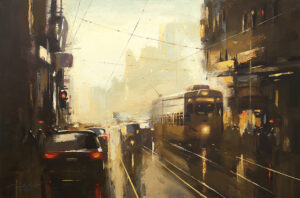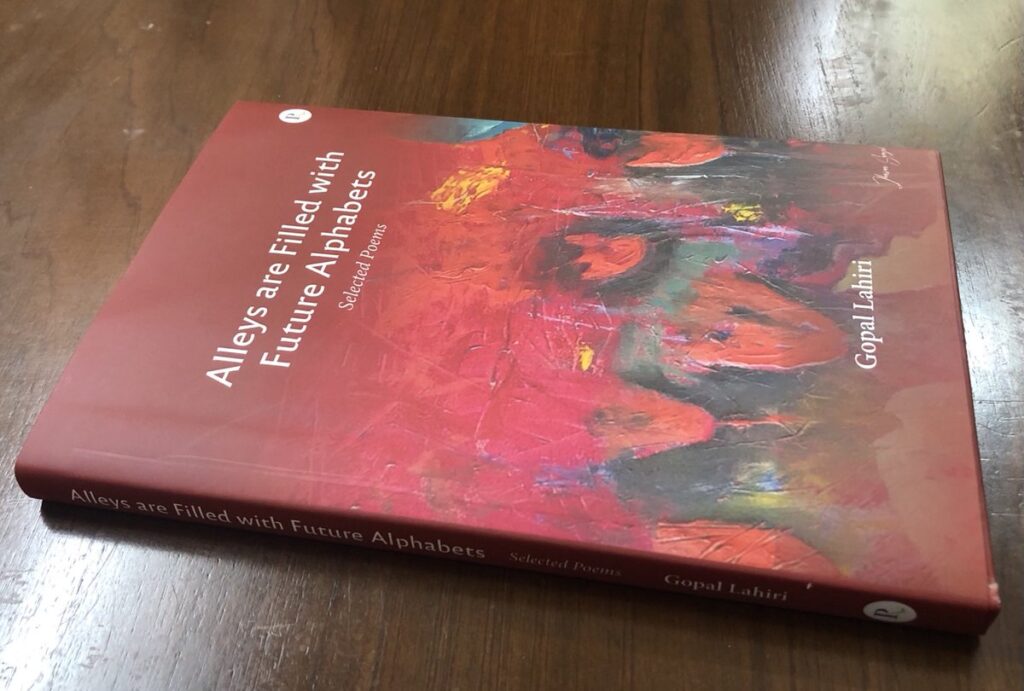Review of “Alleys are Filled with Future Alphabets”
A book of poem by Gopal Lahiri
-by Amanita Sen
–Reading Time – 5 min Approx
Rarely do poems have the ability to hold a mirror to the unexplored corners of the people’s minds- specially those hidden corners that can do with some lights and cure. Poet Gopal Lahiri’s latest volume of poetry “Alleys are filled with Future Alphabets” looks to be having that rare quality of healing that readers search for often, in poetry.

To read his poems feels like traveling somewhere deep inside a cave where words carve the tunnel with care and wonderment. Good poems have this unspoken promise of leading the reader to the unknown terrains of the mind and that is what exactly Lahiri’s poems does to us.
The poem “The other I” pretty much sets the theme of the book which is a dissociation the poet willfully has with his words, as if he is watching them from a distance .
He watches “memories swirl, unspoken membranes pierced”.
“I can feel but never touch” conforms with the theme of dissociation quite evidently.
The last line “You are here but far beyond/ real and more real” quite acts the bridge between what seems to be here and what lies far.
Throughout the book the reader feels compelled to be attentive of the last lines of the poems. It is as if they carry the heart of the poem with all tenderness that his words are marked with.
An undercurrent of pathos run through many of his poems. Quite his forte, this feeling of pathos, Lahiri never goes overboard with the expression of it. Often the words urge a mindfulness to read the subtle suggestions in the expressions.
In the poem “Departure” he writes, “ It’s just one goodbye away from the platform. The reader feels transported to the railway station where the heart feels heavy for the train will leave soon and will probably take away with it what the poet holds close to his heart. “A parallel path of lights, they are fresh from the other world”.. This line connects the journey here to the one to the other world. Then comes “they carry that beauty, they remember the magic”. Poets with their gifted streaks of imagination can pave the path of the other world through their words thus transporting the readers to the coveted places of beauty and magic and Lahiri adeptly does so.
Stars and galaxies make their way in another poem “I still love”.
“Let the glass windows open up lighting up the stars and galaxies and wipe out
the anguish and sorrows”.. and in the end he professes his love saying “ I promise I still love”.
The word “still” here is noteworthy. It tries to make amends for the days lost thinking there wasn’t any love between the two persons.
Love as the theme of the poems seem to play hide and seek with the reader. But if read carefully, it seems omnipresent, not as much in the explicit expressions but more in the suggestiveness of words.
“Picasso’s guitar” is an important poem of this volume. The tone seems urgent and the imageries are carefully crafted by the poet. It feels like the poet has created a canvas that builds up to the last line.
“ More than words, more than a language/ that cut, folded and threaded, glued like zen ripples/ the heart confines itself in vastness/ carry the light on the curved back/ clouds build like Picasso’s guitar tuning the unknown scale.”
 There is a strain of tension that cannot be overlooked in the lines “the splash of my buried alphabets in the languages of notes and octaves/ waiting to burst into silent muse..” And then comes the last line that lays bare the poet’s heart to the readers “ I never play the guitar anymore”. Confessional in its tone this line itself weaves a story or at least holds the potential to one replete with pure emotions at play.
There is a strain of tension that cannot be overlooked in the lines “the splash of my buried alphabets in the languages of notes and octaves/ waiting to burst into silent muse..” And then comes the last line that lays bare the poet’s heart to the readers “ I never play the guitar anymore”. Confessional in its tone this line itself weaves a story or at least holds the potential to one replete with pure emotions at play.
Painting a detailed scene with his words, to hold the interest of the readers comes naturally to the poet. “Eyes focused on the horizon, I could not rise from the empty beach and count my footprints”.
“A round moon rose behind me and lit up the all-encompassing sea like a shining silver sheet”. These lines from the poem ‘Invisible target’ almost paint the sea, the moon, the man on a canvas. It is like the poet takes along with him, his reader in this moon-soaked beach. But while they are in this journey, the poet gives them freedom to loiter around the shores of anguish, pain, longing that rise and falls like waves on the human minds.
“Borrow those silken happy hours I want to count the time layers
smell the minutes and tiny seconds/ floating like petals in dense tequila”.
These lines from the poem “Evening metaphors” give a sensory experience to the readers. Smelling the minutes and tiny seconds is suggestive of a rare intimacy that feels heady; the use of the word tequila is to be noted here. The poet likes to surprise his readers with the use of metaphors and they lie hidden in the most simple acts of the moon casting its spell on the water or the morning sun darkening the skin.
The poet unambiguously declares that the city Kolkata is his muse and his poems testify amply on that. He weaves in the places with the sound, smell, people and the feelings. His lens catches the minutest details of the city, one that is likely to be missed out by both the new traveler and an old resident. But the reading generates a feeling of awe for the city, that the reader is unlikely to get over.
Poet Sharmila Ray in the prologue to this book rightly says, “His poems in general are sharply outlined insects scratching the hard surface of life, sometimes creating a furrow filled with absence and presence reminding life is fleeting, transient and reality is also a point of departure.”
In a quiet undertone the poet lightly but surely knocks at the thinking cells of the reader, paints a few pictures with apparently innocuous words and waits for it to deliver where it needs to.
Here is a book of poems that one has to return to often, to find what meaning the words carry for us with the change of times, how they evolve, where they seem eternal.
-by Amanita Sen
Dear Reader, Hope you liked the post. If you think our initiative “The Creative Post” is worth supporting, then please support us by paying the amount you think we are worthy of. We believe, the value of content should be decided by the consumer. Hence we request you to evaluate our worth and pay accordingly by Clicking Here.


